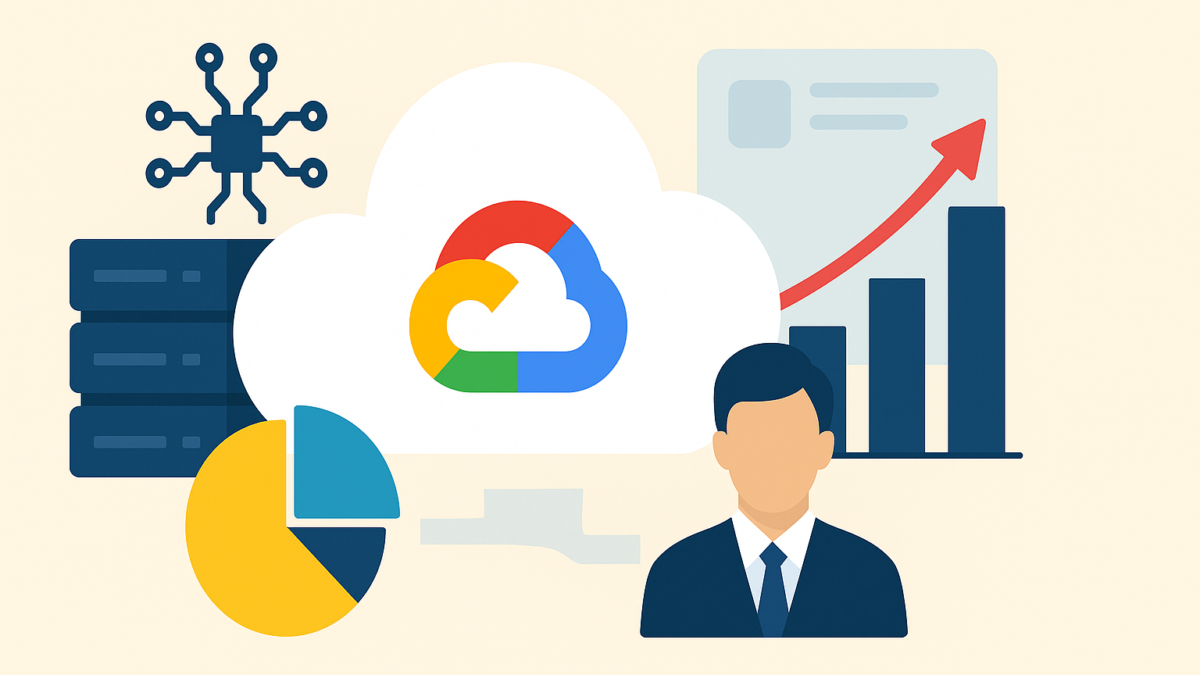Table of Contents
Introduction
As companies move toward digital transformation, cloud computing has become the backbone of modern enterprise infrastructure. One of the leading providers in this space isGoogle Cloud Platform (GCP). But what exactly is Google Cloud, and how can it help businesses scale, innovate, and thrive in a competitive market?
In this blog, we’ll break down what Google Cloud is, explore its core services, and highlight the real-world advantages it brings to businesses across industries.
What Is Google Cloud?
Google Cloud is a suite of cloud computing services offered by Google. It runs on the same infrastructure that powers Google Search, YouTube, Gmail, and other global products. The platform provides a wide range of services, including:
- Compute power (e.g., virtual machines and containers)
- Storage solutions (e.g., Cloud Storage, databases)
- Networking capabilities
- Big Data and analytics tools
- Machine learning and AI services
- Cloud-native development platforms like Firebase and App Engine
Google Cloud is known for its speed, scalability, and cutting-edge data security — making it a popular choice for startups, SMBs, and large enterprises.
Why Businesses Choose Cloud
- Scalability & Flexibility: Whether you’re launching a new product or handling peak traffic, Google Cloud lets businesses scale resources up or down based on demand. Services like Google Kubernetes Engine (GKE) make deploying and managing containerized applications seamless.
- Example: Spotify uses GCP to manage global traffic and real-time music streaming demands without interruptions.
- Advanced Data Analytics & AI: Google Cloud offers powerful tools like Big Query, Vertex AI, and Dataflow that help businesses make data-driven decisions, automate workflows, and leverage predictive insights.
- Fact: According to Google, businesses using Big Query see 5x faster query performance on average compared to traditional databases.
- Enhanced Security & Compliance: GCP is built with multiple layers of security. It adheres to international compliance standards such as GDPR, ISO/IEC 27001, and HIPAA. Businesses can control access with Identity and Access Management (IAM) and use encryption for all data, at rest or in transit.
- Cost Efficiency: With pay-as-you-go pricing, sustained use discounts, and committed use contracts, Google Cloud helps businesses reduce total cost of ownership. Its built-in cost management tools let teams monitor usage and avoid budget overruns.
- Seamless Collaboration with Google Workspace: Google Cloud integrates natively with tools like Google Docs, Sheets, Meet, and Drive, enabling real-time collaboration and productivity, especially for remote or hybrid teams.
Key Cloud Services for Businesses
Here’s a quick overview of essential GCP tools that drive business value:
| Service | Use Case |
|---|---|
| Compute Engine | Run scalable virtual machines (VMs) |
| BigQuery | Real-time analytics on large datasets |
| Cloud Functions | Event-driven serverless computing |
| Cloud SQL | Managed relational databases |
| Cloud Storage | Object storage for any workload |
| Looker Studio | Visualize and analyze business data |
| Apigee | API management for scalable platforms |
How Google Cloud Supports Industry-Specific Needs
- Retail & E-Commerce: Leverage AI-powered recommendation engines and inventory management tools to personalize shopping experiences and improve conversions.
- Finance & Banking: Run secure, compliant systems with scalable infrastructure for real-time fraud detection, data analysis, and customer portals.
- Healthcare: Enable secure storage of sensitive health records and deploy telemedicine apps with high uptime and compliance.
- Manufacturing & Logistics: Optimize supply chains with predictive analytics, IoT integration, and AI-based demand forecasting.
Step-by-Step: Getting Started with Cloud
- Create a Google Cloud Account:
Start with a free trial offering $300 in credits. - Choose Your Services:
Select services based on your business needs (e.g., hosting, analytics, app development). - Migrate Your Workloads:
Use tools like Migrate for Compute Engine or partner support to transition existing apps. - Set Budgets & Permissions:
Define IAM roles, billing alerts, and usage limits. - Optimize & Scale:
Use monitoring and AI tools to optimize performance and reduce costs.
Google vs Competitors
| Feature | Google Cloud | AWS | Azure |
|---|---|---|---|
| AI & ML capabilities | ✔️ Advanced (Vertex AI) | ✔️ | ✔️ |
| Integration with Workspace | ✔️ Native | ❌ | ❌ |
| Pricing Flexibility | ✔️ Transparent | ⚠️ Complex | ⚠️ Complex |
| Open-source support | ✔️ Strong | Moderate | Moderate |
While AWS and Azure are also leading cloud platforms, Google Cloud stands out in data analytics, AI, and collaboration.
Final Thoughts
If your business prioritizes scalability, innovation, data intelligence, and collaboration, then Google Cloud is a worthy investment. Its AI-first architecture, flexible pricing, and robust ecosystem make it ideal for both digital-native companies and enterprises undergoing transformation.
Ready to Transform with Google Cloud?
Whether you’re looking to migrate your existing infrastructure or build cloud-native apps, Google Cloud can help you scale, innovate, and stay competitive.
👉 Explore Google Cloud solutions today and accelerate your digital growth.
You May Also Like: Decoding AI Bias: Why It Matters for Businesses in the Age of Automation





